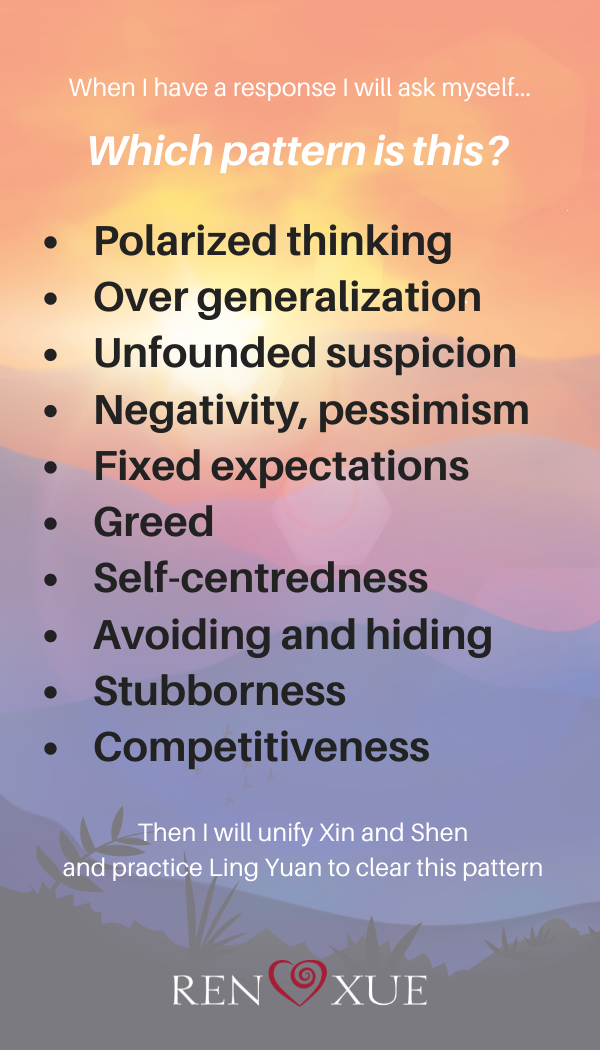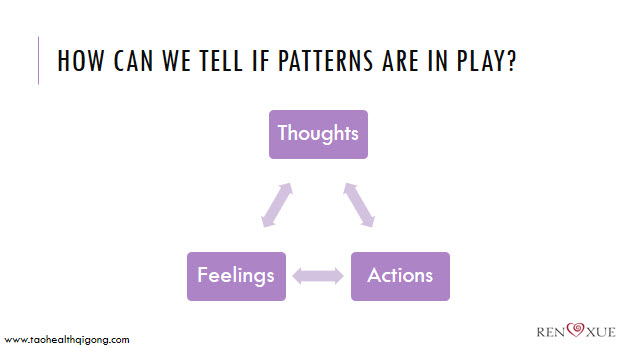10 Tips for Ling Yuan practice

If you are practicing Ling Yuan (the 'patterns clearing' method of Yuan Gong), either thorugh the 'formal' Ling Yuan method, or through general everyday life observation, here are a few tips for helping your Ling Yuan 'patterns transformation' practice:
1. KEEP IT SIMPLE 'BY THE BOOK' (to start with)
When you first learn the 8 formal step Ling Yuan method, along with the 10 fundamental unhealthy patterns of human consciousness, it's good to do things 'by the book' to start with. In other words, just keep it simple. Familiarize yourself with the 10 fundamental patterns, and use them in the 8 step Ling Yuan method. This can keep you busy for years!
Then, once you feel comfortable and very au fait with both the 8 step process, and the 10 fundamental patterns, you can add in the 20 supplmentary patterns, and spend some time working with them. This can keep you busy for a few more years!
And once you have done this, or as you are doing this, you will find that you start 'painting outside the lines'. You will start to notice ways of adapting the Ling Yuan process to suit your needs. This is a natural part of the process and development of Ling Yuan, as delineated in the '3 stages of Ling Yuan' practice.

2. Formal vs Informal Practice
The 8 step meditative Ling Yuan practice for transforming patterns is the 'formal' practice of Ling Yuan.
In order to do the formal Ling Yuan practice, there are certain pre-requisites, both from a learning point of view (ie pre-requisite methods such as Tong Yuan, Tian Yuan and Di Yuan) as well as from the point of view of the benefit of doing a moving practice before the sitting Ling Yuan method practice for maximum benefit.
The purpose of practicing other methods alongside Ling Yuan is manyfold, including the preparation of the mind and body for practice, which puts one in the best state to access Shen, the 'True Self'.
However, we can also practice Ling Yuan in a less formal way, in everyday life: every moment of the day, we can be observing ourselves - our feelings, responses, reactions, thoughts, actions, behaviours... as we do this we will start to become more aware of our patterns, because all our feelings, thoughts, actions and behaviours stem from our unconscious patterns. So we can start to identify and familiarize ourselves with our patterns via our behaviours and responses.
3. FEELINGS - THOUGHTS - ACTIONS

Patterns can be spotted through our reactions and actions.
Reactions and responses to events will play out as feelings, emotional responses, repetitive thought processes, and then actions and behaviours which stem from how we feel and think.
Observation of our feeling responses, thought processes and behaviours is critical for noticing and becoming aware of our patterns.
Once we notice and name the feelings, thoughts and actions, we can track back and identify which pattern(s) these responses correlate with.
4. BELIEFS AND PATTERNS
Patterns have a lot to do with 'unconscious limiting beliefs' which sit in the unconscious psyche.
We behave through our beliefs and patterns, and they are deeply interconnected.
As you start to notice thoughts, feelings and actions, you will start to become aware of unconscious beliefs driving responses and behaviours. Use these beliefs as fodder for your Ling Yuan practice. Work on your 'belief patterns'!
5. PERSONAL PATTERNS
We all have our own smorgesboard of 'personal' patterns because we are all completely unique as human beings.
As we practice self-observation and become more aware of our patterns, we will become aware of these personal patterns.
Personal patterns will show up through our personal responses, reactions, thoughts, feelings, behaviours, beliefs... Notice and welcome everything, and then work on changing and transforming in a healthy way.
6. NOTICE ANY DISTURBANCE
Patterns are usually characterized by emotional and mental disturbance.
In other words, when a pattern is in play, and we are caught up in a pattern, it will be characterized by emotional responses and thought processes which create discomfort inside of us. That discomfort may be emotional, energetic, mental or physical.
Since our 'natural' state is to be calm, relaxed, harmonious, as soon as we are 'kicked out' of our natural state, we can be pretty sure that a pattern is in play. Therefore noticing disturbances is a good way to spot patterns.
As soon as we find ourselves knocked off our 'calm, relaxed, natural perch', and we notice this has happened, we can take steps to noticing and identifying which patterns are in play, and take steps to rectify the situation.
7. SELF-HONESTY AND SELF-COMPASSION
In order to face our patterns, we need courage and honesty. We cannot face our patterns without these two.
In order to be 'radically honest' we need to grow our self-compassion and self-love, so that we can face our flaws. It's not pleasant looking at our 'faults', and so we have to learn to be able to do so without judging ourselves. We have to be able to accept ourselves as unconditionally as possible, and this takes time to cultivate. This is why the practice of 'Tong Yuan' is so necessary, and a pre-requisite for learning and practising the 'formal' Ling Yuan practice.
8. PATTERN THEMES
The more one works on one's patterns, the more one will start to notice recurring 'themes' which stretch across many patterns.
These themes will be personal to us, but also tend to be common for many people, just as the 30 common patterns in Ren Xue are common for many people.
9. SECONDARY GAIN

In the 8 step Ling Yuan method, one of the questions is 'why does this pattern still perpetuate, why does it continue to exist'?
One of the reasons patterns continue to exist is because there is a payoff. This payoff, or 'secondary gain', is an unconscious benefit we are gaining by having the pattern continue.
This means there are beneficial and non-beneficial reasons for unhealthy patterns being in existence, and continuing to exist. We could say there are almost 'healthy' reasons for 'unhealthy' patterns to exist - we are trying to meet healthy human needs, but in an unhealthy way.
Originally these secondary gains were very important, and necessary, but over time we come to realize that the secondary gain is actually keeping us stuck, and causing harm.
Here's an example of a secondary gain:
Say you are a young child, and you are in a family where you get little love and attention, in fact, you are being neglected and treated badly. This makes you feel unhappy and sad.
Then one day you get sick, and all of a sudden you start to receive some positive attention (or at least 'some' attention). Unconsciously you connect in your brain that being sick gets you much-needed attention.
A human being's need for recognition, love, positive attention etc (aka 'emotional needs') is essential for moving forward in a healthy way in life. These needs need to be met during childhood, and ongoingly in life.
The more these needs are met, the more 'whole' we will feel inside. The less these needs are met, the more we will feel like something is missing, that we are not good enough, and then the more we will try to get these needs met, but not in a healthy way.
So back to the example: if we suddenly experience receiving attention when we are sick, we can start to create a pattern of being sick in order to get the attention we need and want. This is called a 'secondary gain' - we are gaining the benefit of receiving attention by being sick.
10. A LIFE-LONG PRACTICE
Be prepared to make practices like Tong Yuan and Ling Yuan (actually all the methods of Yuan Gong) a 'lifelong practice'. There is no end to the possibilities of development!
